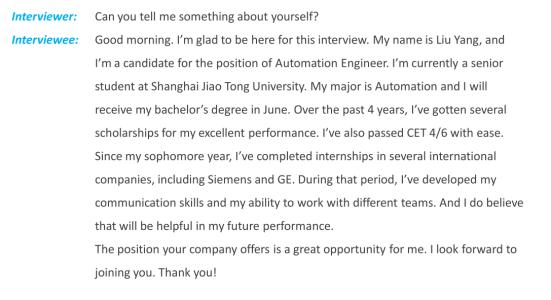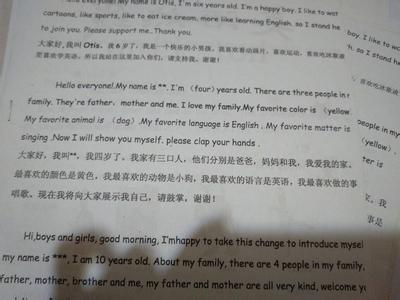在英语课堂中在英语课堂中,为学生创设真实的语言情景,让学生在情境中感知、理解并运用语言,对于激发学习兴趣趣,培养学生的跨文化交际意识和语言运用能力尤为重要。小编整理了面试过程中的英语对话,欢迎阅读!
面试过程中的英语对话篇一
A: If we want you to be the tour guides in Zhangjiajie, how will you introduce it to the tourists?
A:如果我们让你们两位做张家界的导游, 你们怎样把它介绍给游客?
B: I will introduce the scenery spots briefly, especially Huangqizhai, Xianrenqiao, and Baohufeng. The Huangqizhai is famous for its altitude and the unique folk customs, the Xianrenqiao will make you perceive the wonder of nature, and the Baohufeng is, in my opinion, the most beautiful natural scene.
B:我会简洁介绍一下风景点,尤其是黄奇 寨、仙人桥和宝湖峰。黄奇寨以它的海 拔高度以及独特的民俗风情闻名于世, 仙人桥可以让你领略到大自然的鬼斧神 工,而宝湖峰在我看来是最美丽的自然 风光。
C: First of all, I will introduce the main scenery spots in Zhangjiajie. Then I will call the tourists’ attention by giving a profile of the local history and culture. It is, I think, very important for a better understanding of them on the significance of this tour, for the folk customs and the natural scenery are closely related to each other. If the tourists have known nothing about the local historic state but the isolated scenery only, the scenery in their eyes is just a vague i-dea with no differences with others.
C:首先,我将介绍张家界的主要风景点。 然后,我会给游客们简述当地的历史和 文化,让他们体会。因为民俗风情与自 然风光是紧密地联系在一起的,所以我 认为,这在让他们体会到这趟旅行的意 义方面十分重要。如果游客只知道单独 景观,对当地历史状况一无所知,那么在 他们眼中的景色不过是空洞的,与其他 景观没有什么区别。
A: If there is a tourist who complains about your arrangements during the tour, how will you deal with it?
A:在游览途中,如果有旅客抱怨你所做的 安排,你会怎样处理这个问题?
B: It depends. If the things he complains about are not conflicted with the general arrangement and don’t conflict with most of the tourists, I will try to satisfy him, and get some experience from it. But if not, I will point out the problem of changing to him. If his complaint is echoed by most of the tourists, I will think twice about the arrangement and try to improve it to satisfy all the members.
B:这要依据情况来定。如果他所抱怨的事 情与总的安排以及大多数的旅客无冲 突,我会努力满足他并从中学到经验。 如果与此相反,我会指出改变计划所带 来的问题。如果他的抱怨也是大多数游 客的意见,我会重新审视我的安排并尽 量满足所有的成员。
C: First of all, before the tour, I will discuss with the tourists about my arrangement. Although they are not familiar with the scenery here, they come with different imaginations and hopes for the beauty of nature. I will never impose my view upon their. So I make the arrangements carefully after I listen to them. Second, if this happens during the tour, I will also learn the reasons for their complaint and try to satisfy them.
C:首先,在旅游前,我会与游客讨论我的日 程安排。尽管他们对这里的风光不熟 悉,但他们来这里都是带着对自然美景 的想象和憧憬。我不会把我的观点强加 给他们的。在听取了他们的意见后我会 仔细地做出安排。其次,如果在旅途中 有这种情况发生,同样,我将弄清楚他们 抱怨的理由并尽量满足他们。
A: Well, you seem to have all the practical experience to handle these circumstances. We will accept you for a three-month period of probation.
A:这样看来,你们似乎具有实际的经验来 处理这些状况,我们接受你们先进行三 个月的试用期。
B: Thank you. I'll do my best.
B:谢谢,我一定会努力做好。
C: Thank you.
C:谢谢。
面试过程中的英语对话篇二
A: Hello, I am Taylor Pan. Nice to have you here.
A:你好!我叫泰勒潘。有你来,我很高兴。
B: I am very pleased to meet you. I am Hu yao.
B:我很高兴认识您,我叫胡耀。
A: So you are from the same city as I am. How you would like to come and work here?
A:嗨!这么说我们还是同乡。你怎么想到 这儿工作的?
B: Perhaps just like you. I am used to and sort off tired of the inactiveness and routine like work and life deep inland. You know, the coastal places offer more chances for challenges and liveliness.
B:也许正和您相同。内陆城市的工作和生 活都较死气沉沉、机械、呆板,而沿海城 市有更多让你活跃和接受挑战的机会。

A: But do you also know that work here is exhausting and life here is sometimes messy?
A:可是你知不知道这儿的工作更让你筋疲 力尽,生活有时也是一团糟。
B: I know. But I prefer the chances for knowing more different people from different walks of life and different places. I may also have chances to show the tourists around different places of interest.
B:我知道。但我看重这儿的机会,可以接 触更多来自不同地域和行业的各种人 士,也可以有机会带游客到各个名胜之 地。
A: What have you done in the past as a tour guide?
A:你以前做导游都干了什么?
B: As you might see in my application letter. I worked with Star Workers travel Service on a three-year contract after graduation from a tourist school. When I showed my clients around in the city—I just did that, I mean I never went beyond the city limits. When I did that, I enjoyed my time with them. And I tried my best to be most helpful to them and place them and make them enjoy their time-because I learned in school and at work to be quite a “ lingual”. I mean I am able to speak with them in their tongue—besides the local tongue, Mandarin, Cantonese, English and a little bit Japanese.
B:正如我求职信所言,从旅游学校毕业之 后,我与星光旅行社签订了 3年的合同 做导游。我带游客在市内旅游时——我 只在市内,也就是说我从没出过市。我 跟他们过得很愉快。我也尽了最大努力 帮助他们,满足他们,使他们过得愉 快一因为在学校时和在后来工作中, 我学会了当一个“语言家”,我指的是,我 用他们的话跟他们交谈——除了当地语 方言,我会普通话、广东话、英语,还有一 点日语。
A: Hm, you are amazing. Do you think your clients sometimes asked too much of you or troubled you?
A:嗯,你简直是个奇才。你有没有认为你 的旅客有时要求过分或难为你?
B: Yes, sometimes they did. But I had my way to get around. Like I would get them to understand tour guiding and respect tour guides. You know, you can always find a way to deal with it?
B:是的,有时他们较过分,但我有我的处理 办法。比如,我要让他们充分理解导游 工作,尊重导游人员。你总是能找到方 法加以解决的。
A: Well, do you know what is with our agency?
A:呃,你对我们旅行社了解很多吗?
B: Er. I just referred to your agency. You take all sorts of people, you show them wherever they want to be showed, that is, you are very flexible. And you have a large network, internal and external. And you have professional management, which means you accept only professional guides and you expect from them professional work. Of course you also pay them “professional” money, considerably high.
B:我已了解过你们旅行社的情况。你们不 限接待各种游客,他们想去哪里,你们都 带他们去。也就是说,你们很灵活而且 有一个宏大的网络,内部和外部都有。 你们还有专业性质的管理,也就是说,你 们要求你们的导游专业化,当然,你们所 付的薪水也是“专业化的”,相当高。
A: Then what do you think about tips or souvenirs from your clients and kick backs or commissions from the people whose clients you are?
A:那么,你的客人给你小费或纪念礼品或 者你带客人买东西什么的,从卖方得到 回扣或者佣金,你对这些怎么看?
B: Well, professionals should be professionals. Souvenirs are OK, but not kick backs. After all, you need to save your clients* money, too, because you want them to come back to you next time or get their friends to come to you.
B:呃,专业人员毕竟应该是专业人员。纪 念品可以接受,但回扣不行。说到底,你 也得为你的客人节约用钱,因为你需要 他们做你的回头客或是介绍他们的朋友 作你的客人。
A: Come on, Mr. Hu, my compatriot. You are a genius, I’m convinced. I wish I could say you are recruited right now. I will give you my favor when we consider you. Thank you for coming. Wish you good luck.
A:嗨,胡先生,我的同乡。你简直让我认为 你是个天才。但愿我现在就能对你说, 你被录用了。我们考虑你的时候,我会 向着你的。谢谢你来面试。祝你好运。
B: Thank you for your time and favor with me. Good-bye.
B:谢谢您花了这么多时间,谢谢关照。再 见。
面试过程中的英语对话篇三
A: My friend told me that you’re looking for a translator, so I came for a try.
A:我的朋友告诉我,你们正在招翻译,所以 我来试试。
B: I see. Do you realize that most of our work is completed at night?
B:原来如此。你知不知道我们的大部分工 作都是在晚上完成的?
A: Yes, I do. Work starts at 6:30 p. m. and goes to 12:30 a. m.
A:我知道。从下午6点半到上午12点半。
B: You look very young. Do you think your parents will allow you to do this work?
B:你看起来很年轻。你认为你的父母会让 你做这份工作吗?
A: I’m already 28, Mr. Gibson, and I have my own transportation.
A:我已经28岁了,吉布森先生,而且我自 己有交通工具。
B: What do you do in the daytime?
B:你白天在哪儿上班?
A: I work with a translation company as a Chinese-English and English-Chinese translator. I translate business letters, application forms, contracts and etc.. I,ve been there for three years.
A:我在一家翻译公司担任中译英和英译中 的翻译人员。翻译一些商业信件,申请 表格,合同等。我已经在那里工作3年 了。
B: What did you do before that?
B:在这之前你做过些什么?
A: I translated audio cassettes.
A:我翻译磁带。
B: What university did you graduate from? What is your major?
B:你哪里毕业的?什么专业?
A: I graduated from Beijing Foreign Language University with a B. A. in English.
A:我是北京外国语大学英文系毕业的。
B: How good is your Chinese?
B:那你的中文程度如何?
A: Pretty good, I must say, I won many Chinese speech competitions and composition contests.
A:相当好,我必须说,我在许多中文演讲比 赛和作文比赛中获胜。
B: And your English?
B:你的英文呢?
A: Well, my English scores in university were well above average, and I live on my English. I can confidently say that my English is quite good. What do you think, Mr. Gibson? It should be judged by you, after4 all.
A:我在大学的英语成绩都是中等以上的程 度而且我是靠英文吃饭的。我可以很自 信地说,我的英文相当好。你说呢,吉布 森先生?毕竟这还是要由你来判断的。
B: Up to now, I must say you speak English quite fluently. But, still, we’ll have a test of both your language skills and work efficiency. Other applicants have taken It, and you can’t be an exception.
B:到目前为止,我不得不承认你的英文讲 得相当流利。不过,我们还是得测验一 下你的语言能力和工作效率。其他应聘 者都考过了,你也不能例外。
A: I see. Do I get any holidays?
A:我知道了。那有没有休息日啊?
B: No, no holidays.
B:没有。
A: Not any?
A:完全没有?
B: Not any. We work on weekends, on national holidays, and on the New Year.
B:完全没有。我们周末要上班,法定节假 日要上班,新年也要上班。
A: Oh!
A:哦!
B: Let me give you some advice, Cindy. This is very tough work. You need a healthy body and a clear head. If you think after a full day’s work at the translation company, you’ll still have enough energy to work here and keep your thinking clear, you can consider working with us. If not, you’d better reconsider.
B:辛迪,我给你些建议。这份工作很辛苦。 你要有健康的身体和清醒的头脑才行。 如果你觉得自己经过白天一整天的工作 以后,还有足够的精力应付这儿的工作, 同时保持清晰的思维,那你可以考虑来 这里上班。否则,你最好再仔细考虑一 下。
A: Thank you for the advice, Mr. Gibson. I’m in good shape. If I get tired, I’ll consider quitting my job at the translation company.
A:谢谢你的劝告,吉布森先生。我身体很 好。万一我支持不了,我会考虑辞掉我 在翻译公司的工作。
B: Well, Cindy, we'll tell you our decision as soon as possible.
B:那么,辛迪,我们会尽快通知你结果。
 爱华网
爱华网



